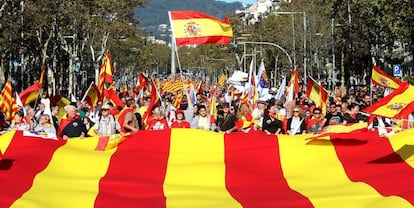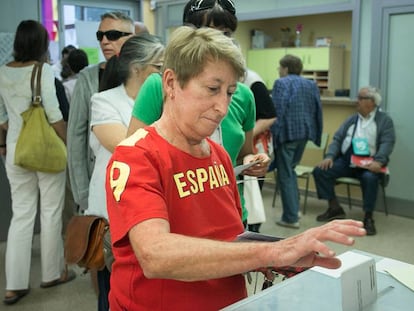Five years of lies about independence in Catalonia
The Catalan government and parliament have twisted reality to create their independence myth

Governments and media outlets all over the world have been focusing on the pro-independence process in Catalonia in recent weeks. But the ¡°process,¡± as it is known in Spanish, has been a long time coming. And these are some of the tricks in its narrative.
Recognize rights¡ or violate them
The right to self-determination that the now-ousted regional authorities in Catalonia have been reclaiming for the last five years, with the backing of hundreds of thousands of people, would involve granting new rights to the Catalans: the ability to freely decide whether they should secede from Spain. But this would, at the same time, dispossess the rest of the Spanish people of a right: that of being able to decide whether their country should continue to be united or should break up. It is not, as such, a demand that would only involve ¡°recognizing democratic rights, but one that would also involve taking them away.¡±
The Spanish state
The two sides of this conflict are not ¡°Catalonia¡± on one side and the ¡°Spanish state¡± on the other. The Catalan institutions (the regional government and the parliament) are institutions belonging to the Spanish state. The powers that they enjoy are granted by the Spanish Constitution, from which the region¡¯s Statute ¨C the laws that set out Catalonia¡¯s autonomous powers ¨C derive. Catalonia does not enjoy its own sovereignty: it belongs to the Spanish people as a whole. At the same time, the Catalan authorities are representatives of the state in that territory. The former regional premier, Carles Puigdemont, was, according to the terms of his position, the ¡°maximum representative of the state in Catalonia.¡± He was paid his salary to serve in this role.

An oppressed people?
Catalonia is one of the regions with the highest per capita income in Spain and enjoys ¨C as do the other 16 Spanish regions ¨C one of the highest levels of self-government in Europe. Among the main demands of the pro-independence leaders has always been for Catalans to contribute less money to the common money pot.
Illegality foretold
The initial demands of the Catalan authorities included doing a deal with the central government on a ¡°legal and agreed¡± referendum. But from the start they warned if there was no legal way of doing it, they would do so illegally. ¡°First it has to be tried in agreement with the law, and, if that can¡¯t be done, do it anyway,¡± said the then-regional premier Artur Mas in 2012. They were already aware that legally such a poll could not be held. The Constitutional Court left it clear in 2008, and has repeated it many times since: no one can authorize an independence referendum in Spain if the Constitution is not first amended. That is because the basis of the Constitution is that sovereignty lies with all Spaniards, not just a part of the population.
The elastic use of the ¡°right to decide¡±
The ¡°right to decide¡± that the pro-sovereignty proponents have been playing up as a fundamental right above the law has a problem: it¡¯s infinite, and were it to come to pass, it would give way to a puzzle of continuous change. If Catalonia is given the ability to decide whether it should separate from Spain, the province of Barcelona could also be granted the right to stay within Spain; and, within Barcelona, the neighborhood of Gr¨¤cia could have the right to separate from the city, and so on and so forth. If the right is a fundamental one, it would have no limits. But the Catalan authorities only recognize the ¡°right to decide¡± for Catalonia. At the same time, they refuse to accept Spain as a single entity.

Two years of open disobedience
The Catalan regional government and the majority of the parliament have, since November 9, 2015, been incurring in open disobedience of the law: that day they approved a motion that declared that from that moment on, they would not obey the rest of Spain¡¯s institutions, that they would only obey regional laws and that they were starting the ¡°process of the creation of the Catalan state,¡± which would be concluded in 18 months. That deadline came and went, however, and it wasn¡¯t until October 27 that the unilateral declaration of independence was voted on. The first part, however, was observed, and for two years they have openly disobeyed all of the court rulings related to their secession plan.
The power of an electoral manifesto
In Spain, being pro-independence is not illegal. In fact, pro-secession parties such as the Republican Catalan Left (ERC) have spent decades running for elections and defending their ideas from parliaments, local councils and public positions of all kinds. But defending ideas and working toward one day putting them into practice is not the same as having the automatic right to put them into practice, whatever the circumstances. And that is whether or not they are included in an electoral manifesto of a party that wins an election. Two other things are needed: securing the required majorities (which in some cases could be on a local or regional level, and in others would have to be national), and to continue down the legal routes to establish them. That¡¯s to say, what is illegal in Spain ¨C as in any other democracy ¨C is to try to carry out the idea of independence (or any other, for that matter) by ignoring and breaking the law, disrespecting the courts and ignoring the majority of the population. That is what the pro-independence forces have done in recent years: the process has been one that the Constitutional Court has described as an ¡°unacceptable route to reform the Constitution on the margins of it.¡±
English version by Simon Hunter.
Tu suscripci¨®n se est¨¢ usando en otro dispositivo
?Quieres a?adir otro usuario a tu suscripci¨®n?
Si contin¨²as leyendo en este dispositivo, no se podr¨¢ leer en el otro.
FlechaTu suscripci¨®n se est¨¢ usando en otro dispositivo y solo puedes acceder a EL PA?S desde un dispositivo a la vez.
Si quieres compartir tu cuenta, cambia tu suscripci¨®n a la modalidad Premium, as¨ª podr¨¢s a?adir otro usuario. Cada uno acceder¨¢ con su propia cuenta de email, lo que os permitir¨¢ personalizar vuestra experiencia en EL PA?S.
?Tienes una suscripci¨®n de empresa? Accede aqu¨ª para contratar m¨¢s cuentas.
En el caso de no saber qui¨¦n est¨¢ usando tu cuenta, te recomendamos cambiar tu contrase?a aqu¨ª.
Si decides continuar compartiendo tu cuenta, este mensaje se mostrar¨¢ en tu dispositivo y en el de la otra persona que est¨¢ usando tu cuenta de forma indefinida, afectando a tu experiencia de lectura. Puedes consultar aqu¨ª los t¨¦rminos y condiciones de la suscripci¨®n digital.










































